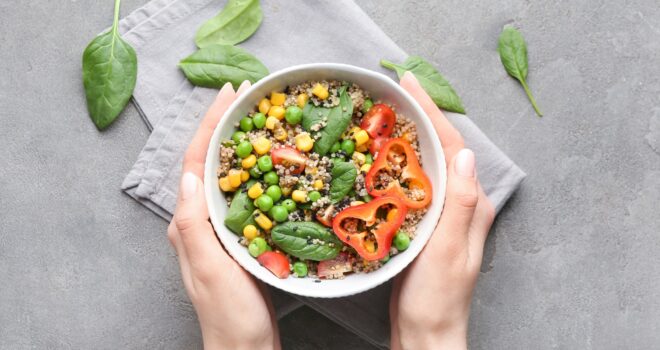The term ‘food transition’ inevitably gives rise to numerous questions about protein: sources, quality, quantity, etc. What if we told you there is nothing to worry about? Let’s take stock of this controversial topic.
There is no doubt: we need to change our eating habits and adopt a more plant-based diet. That naturally gives rise to questions about protein, an essential nutrient. 40% of the human body is made up of protein, a major structural component for muscles and bones. Protein also is required for various bodily functions such as digestion and immune system support.
‘Sure, we’re supposed to reduce our consumption of animal-based foods, but what about protein? That’s a problem!’ In fact, it is not. Did you know that our current intake of protein is actually excessive?
Learn more : Plant-based Proteins to Feed the World
Overconsumption is problematic
ANSES considers that the standard protein intake for a healthy adult is 0.83 g per kg of body weight per day, or 50 g for a 60-kg adult. The agency recommends obtaining 10-20% of energy intake through protein (1).
Today, the French consume an average of 1.4 g of protein per kg of body weight per day (2)! This far exceeds the recommended quantity. 72% of the protein they consume comes from animal sources. Although total protein consumption has decreased between 2010 and 2019 (from 93 g per day to 82 g per day), the share of plant protein has also decreased (3).
Therefore, the consumption of animal protein needs to be replaced by plant protein. The overall rate of protein consumption will naturally decrease:
- Plant-based sources of protein, compared with animal protein, provide less protein per 100 grammes of food product.
- Plant-based protein is of lesser quality: it is less digestible, and incomplete, which means that it does not provide all the amino acids that the body needs (amino acids are the building blocks of protein).
How to eat more plant-based food in just 30 days
Changing our eating behaviours is clearly important. Such change will naturally bring about a reduction in protein intake, which is currently excessive. How to prevent protein deficiency when adopting a plant-based diet? Keep in mind the following two key tips:
- Eat protein-rich foods at every meal.
- Vary sources of protein every day.
Let’s focus on fibre instead of protein
Remember that one of the major benefits of plant-based food is its high nutritious content. Wholegrain cereals, vegetables, fruit, pulses, nuts and grains are essential for a healthy body. They provide vitamins and minerals. One of their main characteristics, however, is their high content of dietary fibre, which affects the entire organism. This includes the gut, which plays a crucial role in health.
The nudge, a great way to encourage people to buy more fruit and vegetables?
The right amount of fibre helps maintain bowel health and reduce the risk of certain cancers such as colorectal cancer. In addition, fibre helps to regulate weight. Furthermore, diets lacking in fibre have been associated with a higher risk of ischemic heart diseases.(4)
Check out some advice in numbers that are beneficial for health and for the planet. Let’s focus on plant-based food and eat more of what is truly good for us. Up for a challenge?
- at least 300 g of vegetables/day
- 325 g of fruit/day
- at least 15 g of nuts and grains/day
- at least 150 g of wholegrain cereals/day
- at least 95 g of legumes/day
- A maximum of 500 g of meat/week
- A maximum of 150 g of cured meats/week
Let’s embrace plant protein and take action: calculate your Popotoscore and learn how to move forward. Should you focus on meat, wholegrain cereals, pulses or fruit? Take the test and find out your priority! https://scoring.fondation-louisbonduelle.org/



 Bean sprouts
Bean sprouts  Artichoke
Artichoke  Vegetable garden: growing lamb's lettuce
Vegetable garden: growing lamb's lettuce 









